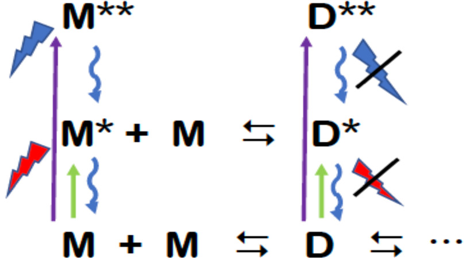
Paper published in J. Phys. Chem. B
Photophysics of Zinc Porphyrin Aggregates in Dilute Water–Ethanol Solutions
Amy L. Stevens, Neeraj K. Joshi, Matthew F. Paige, Ronald P. Steer
Dimeric and multimeric aggregates of a model metalloporphyrin, zinc tetraphenylporphyrin (ZnTPP), have been produced in a controlled manner by incrementally increasing the water content of dilute aqueous ethanol solutions. Steady state absorption, fluorescence emission, and fluorescence excitation spectra have been measured to identify the aggregates present as a function of solvent composition. The dynamics of the excited states of the aggregates produced initially by excitation in the Soret region have been measured by ultrafast fluorescence upconversion techniques. Only the monomer produces measurable emission from S2 with a picosecond lifetime; all Soret-excited aggregates, including the dimer, decay radiationlessly on a femtosecond time scale. The S1 state is the only significant product of the radiationless decay of the S2 state of the excited monomer, and the aggregates also produce substantial quantum yields of S1 fluorescence when initially excited in the Soret region. The resulting fluorescent aggregates all decay on a subnanosecond time scale, likely by a mechanism that involves dissociation of the excited monomer from the excitonic multimer. The ZnTPP dimers excited at their ground state geometries in the Soret region exhibit a dynamic behavior that is quite different from those produced following noncoherent triplet–triplet annihilation under the same conditions. The important implications of these observations in determining the aggregation conditions promoting efficient photon upconversion by excitonic annihilation in a variety of media are thoroughly discussed.

